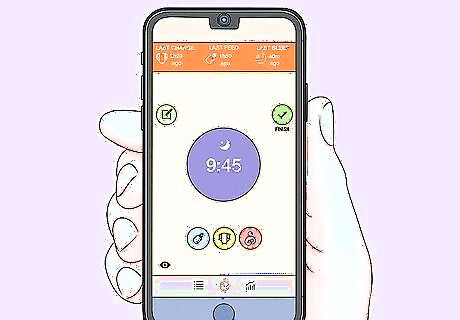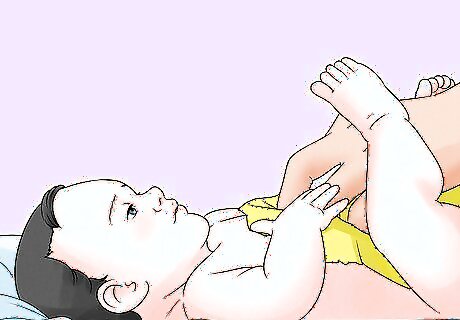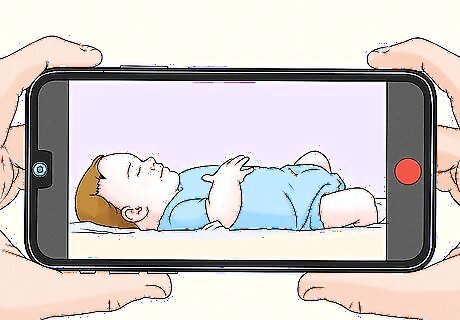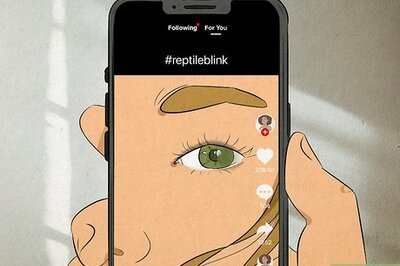
views
Give your body a chance to recover from the delivery.

Take pain relievers, rest, and keep your doctor appointments. It's really easy to focus entirely on your new baby without looking after yourself, but you're still recovering. If you're feeling aches or pains, take over-the-counter pain relievers. If you're recovering from a C-section, follow your doctor's wound care plan and avoid lifting things other than your baby.. Most women have a postpartum physical exam 6 weeks after delivery, but feel free to call your doctor or a nurse hotline if you have questions before then.
Eat nutritious meals and snacks.

Plan on eating small healthy meals throughout the day. You probably find that it's hard to sit down at normal meal times, so try to eat 5 smaller meals during the day instead of 3 big ones. Eat foods packed with vitamins, protein, carbohydrates, and fiber to give you the nutrients and energy to help you recover. Your doctor or midwife will probably recommend that you keep taking your pre-natal vitamin for a while, especially if you're breastfeeding. Skip the alcohol and caffeine which can make it harder to get high-quality rest. Fill your pantry with easy-to-prepare snacks and meals. For example, munch on hummus and pre-cut veggies instead of chips or crackers.
Get comfortable breastfeeding or giving your baby bottles.

Babies eat a lot when they're newborns! Although your baby will lose some of their birth weight, they'll start to make it up in the first month. Your baby will probably want to nurse every few hours. Most newborns take between 16 and 24 fluid ounces (470 and 710 ml) of breast milk or formula in a 24-hour period. Struggling with breastfeeding? Call a lactation consultant who can work with you on latching the baby and different positions to try. Come up with a great organizational system if you're using bottles—keep your clean, sterilized equipment in an easy-to-reach spot so feeding your baby is a snap. Be prepared for spit up! Keep your baby upright for about 30 minutes after they eat and place a burp pad or cloth under them to catch the mess. It might help to pat your baby's back so trapped air gets released.
Relax about routines.

Don't force yourself or your baby into a schedule just yet. You've probably gotten lots of well-meaning advice about feeding and sleeping on a schedule. While that can be great for older babies, newborns really need round the clock care. Trying to follow a strict schedule can also put extra pressure on you when you should try to take things easy and be flexible. If you like having a little control, try using a baby tracking app. You can enter your baby's sleep habits and feeding times to have an idea of how much sleep they're getting and whether or not they're eating enough.
Sleep whenever you can.

Lay down when your baby sleeps so you can get a little rest. Newborns sleep a lot, just not all in one session. This means you won't be getting long chunks of uninterrupted sleep, but you can catch naps here and there. Don't stress about trying to stick to a sleep schedule at this point—your baby is still really little and needs to wake up frequently for food. If you've got family or friends visiting, ask if someone will hold the baby while you grab a quick nap. People love cuddling a newborn and you'll get some much-needed rest!
Get supplies delivered instead of going out.

Limit your trips out and have everything you need at home. Leaving the house to get diapers, groceries, or meals can be a huge production with a newborn. Instead, get things delivered, ask your partner to go out, or see if friends can bring you things you need. Most friends love being able to help out and bringing meals by is a great opportunity. They can drop meals at the door if you don't feel like being disturbed or you can invite them in so they can meet the baby. Set baby supplies along with snacks for you in easy-to-reach places so you don't have to get up once you're snuggled with your baby.
Set up a diaper-changing station so you're always prepared.

Change your baby's diaper as soon it's wet or soiled to prevent diaper rash. It is true that your newborn will go through a lot of diapers so stock up on cloth diapering supplies or disposable diapers and wipes. When it's time to change your baby's diaper, set them on a flat, comfortable surface and keep holding onto them. Remove the old diaper and wipe your baby clean before you pop the new diaper in place. Don't forget to wash your hands! You could also put changes of clothes, diaper rash cream, and a diaper pail or trash can at your diaper-changing station. If you're using cloth diapers, look into diaper services. They can pick up used diapers, launder them, and drop off clean diapers every week or two.
Clean your baby with a quick wipe or bath.

Give your baby a quick wipe every day and a bath once or twice a week. Take a soft washcloth and dip it in warm soapy water. Use it to wash your baby's head, face, and bottom once a day. Then, wipe them with a plain, wet cloth to rinse off the soap. To give your baby a bath—just hold them in a baby bathtub with about 5 inches (13 cm) of warm water and wash them with a soft cloth. Hold onto your baby the whole time and keep water out of their eyes. When you give your baby their daily wipe, start with the face, then move to the head, and finish with the bottom so you don't spread germs to their face. Give your baby a bath in a warm room since they won't actually be submerged in warm water and you don't want them to get cold.
Keep your baby close to you to comfort them.

Walking with your baby or rocking them can settle them when they're fussy. If you want to be able to move around easily while comforting your crying baby, strap them into a snug-fitting front baby carrier. This way, you get close contact and the baby might even fall asleep. It's really easy to wear your baby when you're getting things done around the house, but don't do it if you're cooking or around sharp objects. Is your baby still crying? Try rubbing their back, checking their diaper, or seeing if they're hungry.
Reduce other stressors in your life.

Adjust your standards and don't try to do everything. Newborns are a lot of work! Instead of making lengthy to-do lists, recognize that things can wait or ask other people to help. To make things more manageable, focus on small tasks that have to be done. For example, ask friends or family to bring you meals or tidy up when they drop by to visit. Most visitors are looking for ways to help you, so they'd love to be asked.
Take a few minutes of time for yourself every day.

Carve out personal time to unwind and relax. You probably won't be able to get a huge chunk of time, but even taking a few minutes to shower, read a book, or listen to a podcast can have you feeling more like yourself. This is also a good chance for a partner or friend to look after the baby. Self-care is important for new moms! Don't feel guilty if you need some extra time to yourself or you're struggling to get through the first month with a newborn.
Enjoy this special time with your baby.

Take photos, snuggle, and remind yourself to cherish this time. You've probably heard people telling you that the newborn phase will fly by and it's true. Although it can be a stressful period, find joy in the little things and try to take photos or videos of your baby to remember when they were this little. Feeling guilty about just cuddling up with your baby? Don't! Your baby probably feels the most secure when you're near, even if they are fussy or crying. Remind yourself that you're doing a great job. This is a steep learning curve, but you and your baby are getting to know each other.
Stay connected with your friends and family.

Talk with your support network so you don't feel lonely or overwhelmed. When you're focusing on baby 24/7 it's really easy to feel isolated, but remember that people are there for you! Whether it's catching up on the phone or having a little visit, spend time talking with friends and family. See if there's a birth group you can join to talk with other new parents. It's also fine to limit social gatherings or outings if they wear you out. For instance, if friends want to hang out with you and the baby, it's alright to tell them that you've had a lot of visitors and need to wait a few days.
Ask for help if you're feeling anxious, overwhelmed, or depressed.

It's totally normal to feel ups and downs with a newborn. You're sleep-deprived, recovering physically, and mentally drained. However, if you're constantly feeling hopeless, sad, worthless, or anxious, talk with your doctor about postpartum depression. If you have a partner, work on communication. Let them know what kind of support you need, whether it's holding the baby so you can make a phone call or picking up dinner. Keep the lines of communication open. Your doctor might recommend talking with a new-mom support group, taking antidepressants, trying acupuncture, or getting bright light therapy.




















Comments
0 comment